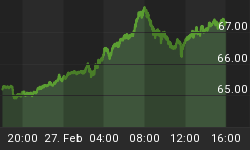
We all knew it was coming - it's that time of year.
Conditioned like teenage children on Christmas morning - knowing the illusion of magic had arrived, yet falling under its spell with arms wide open.
Pure unadulterated joy.
At times, before it - or should I say, he, arrived - it seemed as if this would be the year without Santa. Your grumpy sister warned you about what could happen - if Mom and Dad couldn't afford to buy the magic this year. The terrifying consideration of - what if? Even your grandmother, who's spark had dimmed appreciably with the passing of Pop, seemed eternally bent on conveying that the world was just plain gray - especially at Christmas.
But here we are on Christmas morning - and the magic has arrived.
Even your grandmother is smiling.
Perhaps I over indulged the analogy's fantasy, the way most market participants feel in the face of this weeks extraordinary strength. Moves like this can work their magic on even the most dogmatic and gloomy participants. Especially if the gifts appear larger than the daydreams.
But make no mistake about it - it is an illusion. Behind the scenes, Santa Bernanke knows the magic is as fleeting and as topical as the veneer of Christmas morning. There is no North Pole, no reindeers - no elves. Just a vast and elaborate production set with declining revenues, growing debts and diminishing participants.
As I mentioned in my previous note, I have recently been thinking about time-frames and when the crisis could realistically exhaust itself. To date, the one constant for me has been an elongation of those expectations. With each intervention comes a postponement of the inevitable. The greater the intervention, the longer the impact scale to the markets. This makes natural sense in that our monetary handers are attempting to break the fall of the credit crisis with each respective intervention - but there is no free lunch even if a debit is extended. The rubber will eventually meet the road because the fact remains that credit will inevitably be strangled in Europe by the crisis. Liquidity measures will not prevent the structural challenges the eurozone faces. If you thought Beranke's job was difficult, it makes Mario Draghi's job look downright impossible (see Here). Banks will dramatically curtail lending to private and public interests and the inevitable recession in Europe can not be forestalled by reactive liquidity measures.
This is very similar to the fourth quarter of 2007 - except with bigger capital proportions.
Perhaps the reach of this crisis could have been mitigated if they had taken serious action before it ignited (and even that's debatable) - but certainly not now. Not after the stresses have emerged and made their targets known. That is why this is so reminiscent of the first round of the credit crisis in 2007 when liquidity issues arose, were temporarily addressed by the Fed - but eventually made there way through the system. Insolvent corners of the market first present themselves with illiquid market conditions. Do we actually think the enormous European banks, the lifeblood of the system - will lend with less discretion now then they did last year or six months ago? Will austerity hurt or help the recession now unfolding in Europe?
I can not square a market environment where the U.S disconnects from what appears to be a very serious slowdown in Europe and now China. Perhaps Bernanke can thread the needle now that the German's have called his hand. I suppose they always knew throughout their posturing that he had the most to loose if they simply took their ball and went home. At this point in the crisis though, Bernanke's transparency and perception by the players of having the most chips at the table breaks the illusion that it actually was just a rouse with the house and not a poker game between equals. As illustrated by this weeks actions, all the remaining players need to do is step away from the table. Bernanke either folds the game itself or continues handing out chips like a benevolent uncle in the basement of a family's gambling night.
With that said, here are a few charts of what I am considering today in light of the liquidity measures introduced this week. You could say I am less confident in where the equity markets will trade over the short term - but I am intrigued by where gold is positioned.
If traders react as they did in the past to these kind of liquidity measures - it looks ready to breakout.




More to come in this line of thinking.















